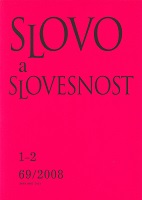Pražská škola: názorová univerzália a specifika
The Prague School: its universal and specific features
Author(s): František DanešSubject(s): Language and Literature Studies
Published by: AV ČR - Akademie věd České republiky - Ústav pro jazyk český
Keywords: Prague Linguistic Circle; types of research organization; functionalism; structuralism; semiotics; holism; Standard Language; literary theory
Summary/Abstract: The Prague Linguistic Circle developed from a free platform for discussions into a wellorganized group of scholars sharing certain basic principles. The School’s teaching consisted in the integration of three complementary concepts: structure, function, and sign (cf. P. Steiner, 1976). This paper discusses the implementation of these concepts by the Prague linguists, mainly the central members of the Circle (Mathesius, Jakobson, Trnka, Havránek, Karcevskij, Mukařovský). Because the members of the group were distinct individuals, their implementation of these principles showed a great variety of opinion. Specific differences may be found on the horizontal axis (between individuals or groupings) as well as on the vertical one (evolution of common principles or the opinions of individuals). This paper deals with opinion divergences in: 1. the treatment of the notion of functionalism (the sophisticated teleological treatment by R. Jakobson vs. the common-sense one by V. Mathesius), 2. the approach to the phenomenon of Standard Language (rather rationalistically by B. Havránek et al. vs. V. Mathesius’ view of language “as a living organism” and emphasis on the expressive and emotional functions), 3. the apprehension and evaluation of artistic literature (J. Mukařovský’s highly sophisticated and abstract aesthetic conception vs. V. Mathesius’s humanistic and moralizing view).
Journal: Slovo a slovesnost
- Issue Year: 69/2008
- Issue No: 1-2
- Page Range: 9-20
- Page Count: 12
- Language: Czech

